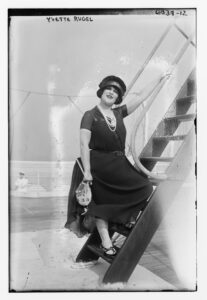Table of Contents
Yvette Rugel: The Miniature Prima Donna
The early 78rpm era had it’s share of musical stars and rising stars; by “early 78rpm era” I am specifically referring to the era of “acoustically” recorded music, typically prior to 1926. And by “stars and rising stars” I’m referring to those musical artists who were able to build their popularity using that, at the time, new recording medium of recorded discs played on phonographs.

Some of the more famous artists of the time included artists such as Al Jolson, a giant in the industry even by today’s standards, as well as Paul Whiteman, The Original Dixieland Jazz Band, Enrico Caruso and Henry Burr. Many of these artists recorded songs that are still famous today, and many of these artists are still well known today.
Not all who recorded in this early era, however, remained well known, and in this space we get to enjoy some of the lesser known artists.
Yvette Rugel hailed from New Brunswick, New Jersey, but it was in Philadelphia that her talent blossomed. The daughter of Russian Jewish immigrants, she stood at less than five feet tall as an adult. Her father, a cigar maker, likely never imagined that his daughter would become a celebrated performer.
Rugel’s career took off in the early 20th century, and she graced the Broadway stage in several notable productions. Among them were The Passing Show of 1917, George White’s Scandals (1919), and Earl Carroll’s Vanities (1926–1927). Her billing as an “opera star” or “The Miniature Prima Donna” on vaudeville bills captured audiences’ attention, and her performances were nothing short of captivating.
As the era of talking pictures dawned, Rugel remained optimistic about opera’s future. She observed, “The talkies are attracting all the great singers, and great song and musical effects are being produced to the great education and pleasure of a mass of people.” Her enthusiasm reflected the transformative impact of sound in cinema.
Critics had varying opinions of Rugel’s singing. Bland Johaneson noted the startling quality of her voice, emphasizing her unique approach to familiar vaudeville hits. Later, Burke Henry described her voice as a “lyrical spinto” after her performances in Rome, Paris, London, and Venice. New York columnist Dale Harrison hailed her as having “one of the finest theatre voices in town.”
Recording in the 78rpm era was fraught with challenges. The acoustic recording process required performers to play in front of a large horn that mechanically etched the sound onto a master disc. This method allowed for no mistakes or retakes; every note had to be perfect. Rugel’s recordings stand as a testament to her exceptional skill and patience. Her ability to convey the nuances of her performances within the constraints of the acoustic recording process was nothing short of remarkable.
